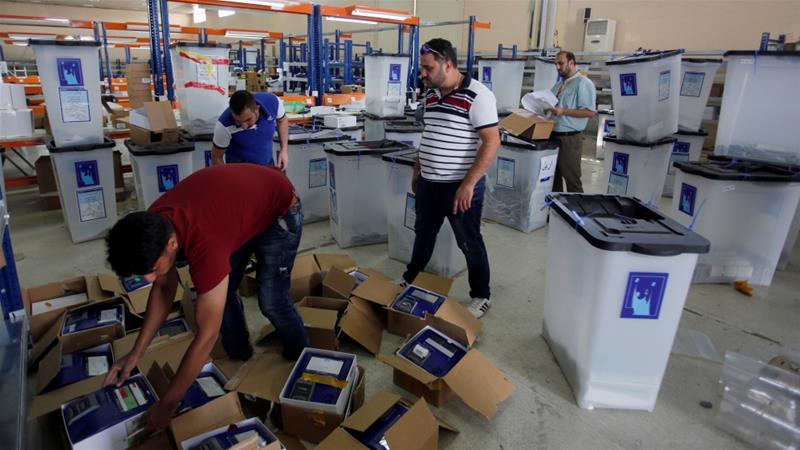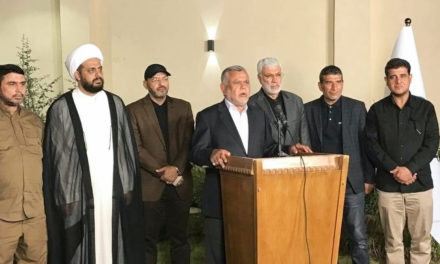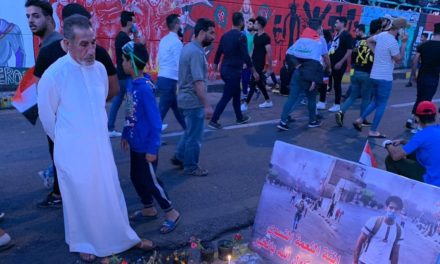(Iraq’s Independent High Electoral Commission. Khalid al-Mousily/Reuters)
Iraq’s May 12 general election left in its wake heavily disputed results and a turbulence that could produce a protracted political and constitutional crisis at a bad time as the country struggles to recover from years of war.
The post-election chaos has so far involved widespread claims of fraud, gun attacks on political party offices, hasty rewriting of the election law, torching of ballot warehouse, siege of IHEC offices and personnel, sacking of the IHEC commissioners, and the attempted annulment of many thousands of ballots. Against this backdrop, the maneuvers by Moqtada Al-Sadr’s Sairoon bloc to form the next government seem to be going in the direction of bringing in the same old players.
The direction of events highlights three issues. First, Iraq was under-prepared and should have seriously considered rescheduling elections. Second, despite a stronger civil society and the evolving position of religious leadership, the entrenched oligarchy is winning yet another round. Third, that the damage to Iraq’s Independent High Electoral Commission (IHEC) legitimacy will haunt Iraq for a long time.
Iraq decided to hold elections in May in order to avoid a legislative vacuum when the outgoing parliament’s term lapses. In light of recent events, however, it can be argued that Iraq went out of the frying pan and into the fire. A legislative vacuum is an imminent reality now that the 2014 Parliament expires June 30. The ongoing crisis is as serious, if not worse, than the perceived one Iraq was trying to avoid in the first place.
The problem is that while powerful politicians were eager to hold elections, the country was not ready. More than two million people were, and remain displaced, resulting in a large vulnerable group who could not vote, or whose votes could be bought, manipulated, and were almost annulled by the outgoing parliament. Additionally, voter registration and the distribution of the new voter cards, which was some 71 percent complete nationwide, was only 63 percent complete in Mosul creating barriers to participation as well as room for fraud.
The casual way with which Iraqi politicians handled the issue of Internally Displaced Persons’ (IDPs) votes risks greater disillusionment among this key demographic, which has been in dire need of electing new legitimate representatives after four destructive years of conflict and chaos. Coming on top of painfully slow and underfunded stabilization efforts, denying this demographic the right to choose true representatives adds insult to injury, and could waste the fleeting window to capitalize on the fragile security gains in areas liberated from Da’ish.
The decision to adopt electronic counting proved rushed too. While the technology is not bad in and of itself, IHEC proved not ready to absorb it and verify its effectiveness and security. Prime Minister Haider Al-Abadi acknowledged that on June 5 when he pointed out that the devices was the main issue. Red flags were everywhere. When an Iraqi voter in the Washington area asked a visiting senior IHEC official if these devices had been tested by a third party, the official tried to play down fears and assured that the devices had performed successfully in elections in Russia!
The U.S. could have helped Iraq think the timing through, but instead took the assertions that Iraq is able to hold elections at face value. Washington’s attitude, as it insisted that elections be held in May, is reminiscent of the ‘Iraq-will-muddle-through’ mentality that caused the long U.S. diplomacy malaise during the second Maliki term while the country was slowly sliding into the abyss. It reflected focus on superficial and quick results, rather than substance.
Despite the upheaval, a government will be formed, sooner or later. And this future Iraqi government will not look much different from its predecessors–at least at the outset. The threat posed by the election fraud is somewhat moderated by the prospects of stabilization through an alliance–presumably brokered by Iran between Sadr and the Popular Mobilization Forces (PMF). Sadr’s move shocked some of his supporters and allies. Some saw it hypocritical, as Sadr himself had chastised Prime Minister Abadi in January for announcing an alliance with the PMF that ultimately lasted less than 24 hours.
This Sadr-Ameri alliance marked the first step toward yet another one of what I call a ‘government of everyone’, as indicated by Sadr’s subsequent alliance with Abadi, and the statement upholding Sadr’s previous alliances with the Kurdistan Democratic Party (KDP), Patriotic Union of Kurdistan (PUK) and Hikma. Boring horse-trading will ensue. At the end, the resulting government will be one that is shaped by the balance of power among the oligarchs, and formed to serve one thing, the interests of the oligarchs, and only incidentally the interests of their respective constituencies. These factors, not the will of the electorate, will prevail for another four-year term. The Iraqi oligarchy has proven to have a powerful buffer system, one that can absorb and shrug off any electoral swings. As the Iraqi proverb says, “You want rabbit? Here’s rabbit. You want deer? Here’s rabbit”.
There will be one clear losing organization, and that is the Da’wa Party. Da’wa disintegration seems quite possible after one of the party’s wings, Abadi’s, joined Sadr and Amiri, while the wing led by former Prime Minister Nouri Al-Maliki is so far excluded. The fact that Sadr abhors Maliki (the feeling is mutual, I assume), and that Maliki does not have much to offer in exchange for a role in government, suggests his bloc, or at least Maliki himself, will be left out. The elected members of Maliki’s coalition will likely jump ship and join others, signalling the end of one of Iraq’s oldest parties that had a dominant role in governments since 2003.
Despite the bleak picture, one should not forget the important, partially positive, trends that characterized this election. It is fair to say that 2018 witnessed the first signs of a maturing electorate and the rise of social mobilizers, notably through political satire, more or less independent of the political establishment, promoting a grassroots culture that demands better governance and accountability. The pressure by the public, through clear emphasis on issues and disinterest in sectarian politics, forced the parties to change their veneers, if not their core values, from Islamist to reformist.
Civil society mobilization was not all positive. The fact that many voters boycotted the election, partly a result of organized boycott campaigns, partly as a passive result of disillusionment, helped the oligarchs. The boycott not only failed to make a positive change but essentially backfired, highlighting the inherent risk of low turnout. This should be a lesson learned for Iraqi voters: a boycott that is not total and complete, a very remote possibility, can easily hasten the delivery of the very outcomes it was designed to prevent.
We also saw a rare positive case in which religious leadership effectively told the voter to go ahead and do what he or she thinks is right. The statement issued by Ayatollah Ali Al-Sistani was a remarkable message in two respects, which combined reflected support for liberal, democratic and individualistic values. First, its emphasis that voting is a civil right to participate in building a democracy, not a religious obligation to promote an Islamist government. Second, it appealed to voters to choose their representatives based on merit and nothing else. That was absolutely remarkable. The statement, unfortunately, was viewed mostly negatively in Washington for its perceived role in weakening turnout and Prime Minister Abadi’s chances for winning a second term in office.
This is a case of the Church distancing itself from the State. Will the oligarch-controlled State let it?
The main dilemma is IHEC legitimacy and the recount. If the recount is to proceed with regard to only select polling stations, as opposed to a full recount, and counter to the intention of both parliament and the Supreme Federal Court, then Iraq has two problems. First, limiting the implementation of the election law amendment (notwithstanding the shady circumstances of its passage) to 7% of polling stations will erode the legitimacy of all results. This reduction of scope came after powerful parties, including the PMF, Moqtada Al-Sadr and the two main Kurdish parties voiced their strong opposition to a full recount. The situation feeds suspicion that someone is hiding something. At the heart of the problem is the fact that some Iraqi parties had decided before the elections what their share of seats must be. There is video evidence of at least one such frighteningly accurate prediction, perhaps decision is a more suitable word.
There is nothing that can reverse the perception among Iraqis that elections were tainted. After all the IHEC commissioners were thrown under the bus by the government for it. Now if the 7% recount does not produce a meaningful change in results, then Iraq will have to live with a government whose legitimacy will always be in question.
Restoring the legitimacy and independence of Iraq’s electoral commission is perhaps the most critical requirement before future elections. Time is limited, since the important provincial councils elections are mere months away. It is not clear if or how this task can be achieved. When it emerges, the government that will inherit this crisis will be full of parties that will be more interested in finding better ways to stack the deck, than in rocking the boat that carried them to the top.

Omar Al-Nidawi
Omar Al-Nidawi is an Iraq analyst based in Washington D.C. and he is a fellow with the Truman National Security Project. The views expressed here are his own.










